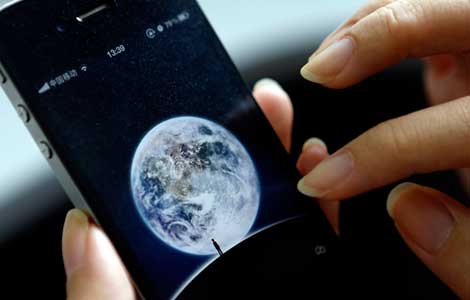'Black Monday' as WeChat service lost
Updated: 2013-07-23 07:27
By He Wei in Shanghai (China Daily)
|
||||||||
The breakdown sparked an outcry from avid users. By January, the app had 30 million registered users after operating for only two years.
Zhang Jingfei, a university graduate in Henan province, said: "I kept refreshing my friend circle page almost once every three minutes. My mind went blank when I lost my personal page."
Zhang said she relies heavily on WeChat, as it allows users to leave voice messages, communicate with friends in real time or have video-conferencing contacts.
Mobile messaging apps have gained in popularity over traditional telecom services.
The country's top telecom operator, China Mobile, has signaled a clear shift from traditional voice and message business to data traffic management, company head Xi Guohua said last month.
According to the company, in the first five months of this year its wireless data revenue rose by 61 percent year-on-year, while voice-service sales dropped by 2.4 percent.
People become upset over any interruption in service, with many mobile phone users opting for the fast and free messaging services.
Being hyper-connected is a point of pride for aspiring white-collar workers. However, for many it goes beyond increasing their sense of self-worth to being vital to do their jobs.
Tao Weishuo, a university staff member responsible for student affairs in Shanghai, said he uses WeChat's group messaging functions to send notices to more than 100 students in the fastest way.
Experts say mobile phone dependency is a growing phenomenon, if not a problem.
A poll conducted by Tencent in October found that people compulsively check their mobiles when commuting to work, during pre-dinner drinks, in the middle of the night and even when using the bathroom.
But Guan Herong, social media director of online advertisement-tracker AdMaster, said social networking apps may distract workers.
"The bombardment of information from smartphones causes people to prune e-mails of important content and sacrifice time and energy that would otherwise be spent on important tasks," he said.
Jian Fang, general manager of mobile advertisements at digital advertising company hdtMedia, said while such apps enable people to keep up with their jobs, colleagues and friends in real time, becoming addicted to the devices indicates anxiety about the future.
"When you post something on your personal page, you keep refreshing it to see how many people have commented or forwarded it. That's the kind of influence you wish to exert on the external world," she said.
Most Viewed
Editor's Picks

|

|

|

|

|

|
Today's Top News
Germany to probe spy services' ties with US
Snowden hopes to leave airport by Wednesday
Quake in NW China kills 89, injures 700
US blacks, whites split on Zimmerman verdict: poll
Kissinger and Jiang see bright future for relations
China sees no major forex withdrawal: regulator
Business holds up for Minmetals arm
Beijing knife attack leaves one dead
US Weekly

|

|














